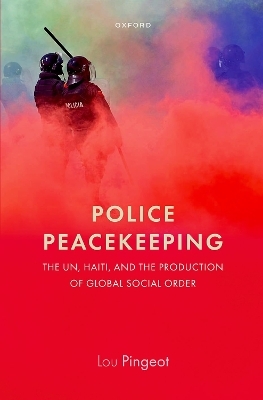
Police Peacekeeping
The UN, Haiti, and the Production of Global Social Order
Seiten
2023
Oxford University Press (Verlag)
978-0-19-888661-7 (ISBN)
Oxford University Press (Verlag)
978-0-19-888661-7 (ISBN)
This book questions the optimistic reading of police peacekeeping often found in both academic and policy circles. Lou Pingeot provides an in-depth study of UN intervention in Haiti to show how a single site can help to shed light on how policing functions globally.
UN peace operations increasingly deploy police forces and engage in policing tasks. The turn to 'police peacekeeping' has generally been met with enthusiasm in both academic and policy circles, and is often understood to provide a more civilian instrument of intervention, better suited to mandates that increasingly emphasize protection. Rebuilding local police forces along democratic, liberal lines is seen as a prerequisite for a successful transition towards peace and stability. In this book, Lou Pingeot questions this optimistic reading of police peacekeeping, and demonstrates that the logic of policing leads to the depoliticization of conflict and the criminalization of those who are deemed to threaten not just public order but social order, authorizing violence against them in the name of law enforcement.
Police Peacekeeping proposes a new way of studying peace operations that focuses not on their success or failure, but on how they allow people and ideas to circulate transnationally. It shows that peace operations act as a point of cross-fertilization for the creation and transmission of policing discourses and practices globally. In so doing, these missions contribute to (re)producing social orders that are based on the exclusion of often racialized, socio-economically marginalized populations, both 'domestically' (in countries of intervention) and 'internationally' (in troop contributing countries). The book draws on and contributes to critical understandings of police power that show that police forces were never meant to protect all equally. It also furthers our understanding of policing at a global level.
Drawing on interpretive, feminist, and postcolonial methodologies that emphasize relations, processes, and situatedness, Lou Pingeot's in-depth study of UN intervention in Haiti shows how a single site can help illuminate global processes. Rather than starting from Haiti's supposed deviance from international expectations and norms, she posits that Haiti can reveal a great deal about how policing functions globally.
UN peace operations increasingly deploy police forces and engage in policing tasks. The turn to 'police peacekeeping' has generally been met with enthusiasm in both academic and policy circles, and is often understood to provide a more civilian instrument of intervention, better suited to mandates that increasingly emphasize protection. Rebuilding local police forces along democratic, liberal lines is seen as a prerequisite for a successful transition towards peace and stability. In this book, Lou Pingeot questions this optimistic reading of police peacekeeping, and demonstrates that the logic of policing leads to the depoliticization of conflict and the criminalization of those who are deemed to threaten not just public order but social order, authorizing violence against them in the name of law enforcement.
Police Peacekeeping proposes a new way of studying peace operations that focuses not on their success or failure, but on how they allow people and ideas to circulate transnationally. It shows that peace operations act as a point of cross-fertilization for the creation and transmission of policing discourses and practices globally. In so doing, these missions contribute to (re)producing social orders that are based on the exclusion of often racialized, socio-economically marginalized populations, both 'domestically' (in countries of intervention) and 'internationally' (in troop contributing countries). The book draws on and contributes to critical understandings of police power that show that police forces were never meant to protect all equally. It also furthers our understanding of policing at a global level.
Drawing on interpretive, feminist, and postcolonial methodologies that emphasize relations, processes, and situatedness, Lou Pingeot's in-depth study of UN intervention in Haiti shows how a single site can help illuminate global processes. Rather than starting from Haiti's supposed deviance from international expectations and norms, she posits that Haiti can reveal a great deal about how policing functions globally.
Lou Pingeot is a Postdoctoral Fellow at the University of Ottawa. Her research is situated at the intersection of global historical sociology, postcolonialism, and international practice theory. She is interested in the link between external and internal security and how practices and discourses of intervention circulate transnationally, with a focus on the role of police forces. She has carried out research on policing in UN peace operations and in Canada.
1: Introduction: UN peace operations, global policing, and social order
2: Beyond the here and now of peace operations
3: Protecting civilians or enforcing order?
4: Haiti as a site
5: Policing the urban poor
6: Policing dissent
7: Building peace by building prisons?
8: Conclusion
| Erscheinungsdatum | 28.09.2023 |
|---|---|
| Verlagsort | Oxford |
| Sprache | englisch |
| Maße | 164 x 242 mm |
| Gewicht | 616 g |
| Themenwelt | Sozialwissenschaften ► Politik / Verwaltung ► Europäische / Internationale Politik |
| Sozialwissenschaften ► Politik / Verwaltung ► Staat / Verwaltung | |
| Sozialwissenschaften ► Soziologie | |
| ISBN-10 | 0-19-888661-6 / 0198886616 |
| ISBN-13 | 978-0-19-888661-7 / 9780198886617 |
| Zustand | Neuware |
| Informationen gemäß Produktsicherheitsverordnung (GPSR) | |
| Haben Sie eine Frage zum Produkt? |
Mehr entdecken
aus dem Bereich
aus dem Bereich
Studienbuch
Buch | Hardcover (2023)
De Gruyter Oldenbourg (Verlag)
44,95 €
Amerikas Strategie der Vorherrschaft und der Kampf um Eurasien
Buch | Softcover (2024)
NOMEN Verlag
20,00 €


